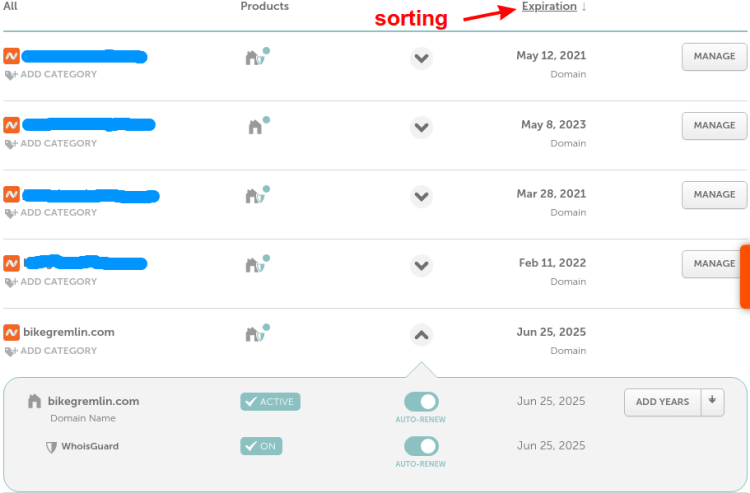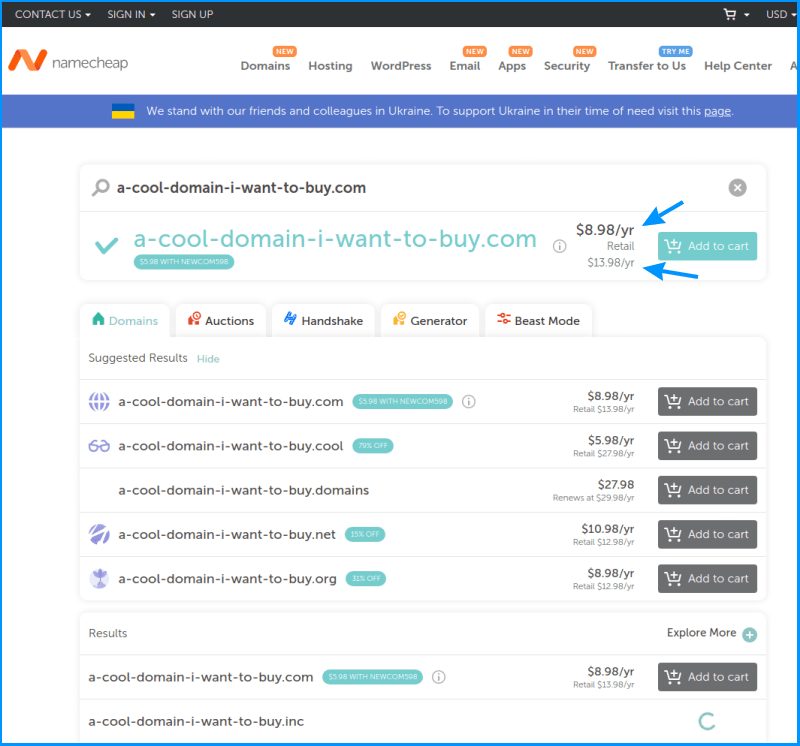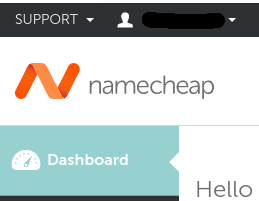In this post I’ll share my experience (some call this a review) with the Namecheap domain registrar (affiliate link). To avoid any misunderstanding: Namecheap also offers web hosting, among other services, but this post deals only with their services related to domain registration. None of my reviews, including this one, is paid for, or asked for, by any company (for anyone interested: why I write these reviews). What is a domain and domain registration.
Status: Passive
I tested/used the service from September 2018 – to April 2022
Contents:
- Introduction – how I came to Namecheap
- Domain registration and renewal
- Namecheap technical support and user interface
- Namecheap prices and business policy
- Conclusion and my personal opinion
1. Introduction – how I came to Namecheap
All of my domains were registered with the company IONOS (formerly 1and1). As you can read in my IONOS (1and1) domain registrar review, I had some issues I needed to fix. I asked around for alternatives and one of the recommendations was Namecheap. So I moved one, and after a few months, all the other domains as well (how to transfer a domain from one registrar to another). Why did I like Namecheap?
2. Domain registration and renewal
To say it right from the start: my main objection is that Namecheap doesn’t show domain registration renewal price at the time of registering (or moving) a domain with them.
Another objection is when transferring a domain off Namecheap, to another registrar. Emails you get to confirm and speed up the transfer are a bit confusing, so I wasn’t sure what I should click/do to make the transfer start right away. IONOS, for example, does this a lot better, with clear instructions. I haven’t saved copies of those emails, so you’ll have to take my word for it, or try for yourself (if any readers have copies of these emails, please do send them to me so I can show an example – with all the private data masked, of course).
In spite of all that, domain registration and renewal go easily and smoothly with Namecheap. I also love the fact they allow putting funds on your account in advance, so they can be used for domain renewal, or registration of a new domain, regardless of whether it is done automatically, or manually. To me this is important, because Serbian banks are not very reliable (I wrote about my experience with Serbian Banca Intesa, though other Serbian banks are no better – in my experience at least). The option for this is shown in the main menu, once you are logged in:

Picture 1
I haven’t tested the reliability of the automatic domain registration renewal. I renew all my domains well before they are due to expire (as soon as they are within their last year, if not even sooner). I would advise this to anyone. If the automatic renewal is used, you will be charged 30 days before the domain expiry, when the renewal is first attempted (don’t worry, your domain registration will not lose those 30 days, each renewal is done by adding a whole year to the expiry date). So it is important to have money on your card, or on your Namecheap account at this time (30 days prior to domain registration expiry date).
I don’t know what the procedure is if your card payment doesn’t clear (and you have no funds, paid in advance, on your Namecheap account). I have read that your whole account gets locked until you pay and you can’t even transfer domains off Namecheap while your account is locked.
Which leads us to my first moral dilemma. Should I disclose unconfirmed information, potentially doing an injustice to Namecheap, even though my personal experience is that they are good and reliable? This reminds me of the situation I had when testing Yoast vs The SEO Framework WordPress plugins, where I had to publicly apologize to plugin authors for publishing incorrect information, in spite of my best efforts to be as objective as possible (adding updated, more accurate test results at that stage). On the other hand, I wouldn’t like to lead anyone into a problem, by recommending Namecheap, without noting potential problems. So please take this as an attempt to provide objective information: a discussion from 2016 about Namecheap problems. I am hoping that constructive feedback from other users (perhaps even from Namecheap as well) will clear up any doubts and confusion. All feedback can be provided in the comment section, or to my email: my name (relja) @ this domain (bikegremlin.com).
They do not charge extra for WHOIS privacy protection, which is great.
3. Namecheap technical support and user interface
Their technical support is excellent: they are professional, polite, answer quickly and explain thoroughly, solving any problems.
They also have an excellent knowledge base (Namecheap knowledgebase). It’s so good that in some posts I linked to their articles, because they are well written and explain everything. The Internet is a great source of information, human knowledge sharing, and Namecheap greatly contributes to this (my long-winded post about .com domain price hike and the direction the Internet is taking).
Update, May 2021:
When visiting Namecheap’s knowledge base using the Windscribe VPN (with a static IP), I get caught by Cloudflare bot-captcha protection, asking me to click on boat images. As I explained at the start of my article on how to secure a (WordPress) website, every additional security measure often introduces a certain amount of inconvenience to users. The Namecheap guys know whether this is a necessary measure, but I certainly find it a bit frustrating, as a user – and as a person linking to their knowledge base articles.
User interface is among the best I’ve seen. Clear, logical, and intuitive.

Picture 2
They even have a great application for Android and iPhone. Not that domain configuration and registration is something I do daily and need to do while “on the move,” but for some people I’m sure this would come in handy.
2FA (multifactor authentication) is easy to configure and it works – which is important for crucial stuff like domain registration and ownership. How to configure 2FA with Namecheap.
4. Namecheap prices and business policy
At the time I had transferred domains from IONOS, Namecheap was among the cheaper reputable domain registrars. Today it is no longer the case. Not the most expensive, but no longer among the cheapest. For example, .com domain renewal costs around $13, Porkbun offers it for about $8.5, while GoDaddy charges around $20.
As far as business policy goes, they don’t threaten to send debt collectors, like IONOS does (the link explains that). There are potential problems (that I haven’t experienced) explained in this post’s 2nd chapter.
I don’t like that, during domain registration, or transfer, they don’t state how much registration renewal will cost. You have to actually go and register a domain (or transfer it), then click on renewal, in order to see how much it will cost.
Update, July 2022:
At this moment, Namecheap states the domain renewal fee, right from the start. It’s just labelled “Retail” instead of “Renewal.”

Picture 3
All in all, I don’t consider this company to be “shady” or problematic – quite the contrary.
5. Conclusion and my personal opinion
As you can see in picture 2, this domain is registered with Namecheap. Can’t give a more honest recommendation than that.
I listed all the pros and cons in this post, so you can decide for yourself whether this domain registrar is the right choice for you, based on your priorities and criteria.
It’s fair to say that I’ve moved some domains to Porkbun (affiliate link) – my review of the Porkbun domain registrar. If they prove to be solid, within a year, or two, I’ll probably move most domains to Porkbun, at least if Namecheap remains that much more expensive as is the case now. For the less tech. savvy, I would recommend Namecheap over Porkbun, because of a better knowledge base, more online tutorials and a bit friendlier user interface. In addition to that, Namecheap is tried and reliable, while I’d give Porkbun a year or two to confirm that.
Update, May 2021:
Since I wrote this article, at the start of 2020, Porkbun have not been sitting idly by. As you can see in my updated Porkbun review, they have polished and improved the user interface and expanded the knowledge base. At this moment, practically all of my domains are registered with Porkbun (see the Porkbun review for more details).
If you decide to go with this company, you can use my affiliate link for Namecheap domain registration, thus supporting this website, without it costing you anything extra. At this moment, for me, Namecheap is in a very high and well deserved 2nd place, right behind Porkbun.

